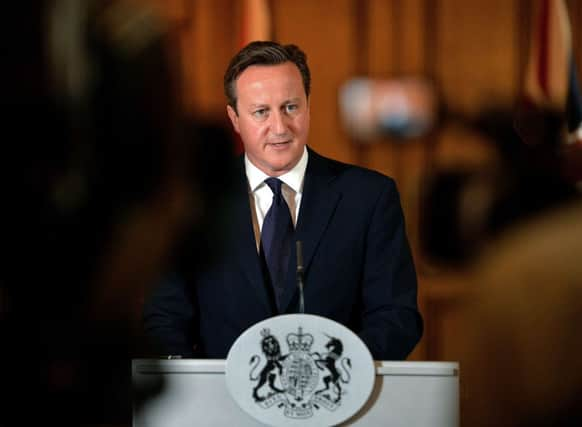Leaders: Response to IS must be carefully measured


Little wonder that international attention in the wake of this latest atrocity has swung sharply to the response of the British government. Here Prime Minister David Cameron faces a most searching dilemma.
After the experiences of Iraq and Afghanistan, there was a widespread conviction across parliament and the country that Britain should never again be dragged into an armed conflict in the Middle East. That mood is rapidly changing.
Advertisement
Hide AdAdvertisement
Hide AdThe prime minister is under growing pressure to respond, not only with aid and supplies to the Kurds and other forces, but also to engage directly with air strikes against the Islamic militants.
This dilemma is compounded by the timing of these developments. Mr Cameron has to articulate an appropriate response that reflects the national revulsion against IS and the threat that the spread of murderous terrorism presents to the region, while at the same time struggling to prevent the break-up of the UK.
The stakes could hardly be higher, and the collision of these two events inarguably present him with the great challenge of his premiership.
So charged is the political atmosphere at home that some fear a decision to launch air strikes at this time would impact on his chances of securing a No vote in the referendum. But these are two totally separate issues, and they must be dealt with separately, rather than allowing speculation of possible political consequences to cloud the issues at stake.
The choice before him is whether to continue with the current policy of giving arms, ammunition, technical equipment and training to the Kurds to enhance their fight against IS, or step up the UK’s response with direct military involvement through air strikes.
The latter option requires careful consideration, not least on logistical grounds, and will require time to organise and prepare. Almost by definition that would rule out the possibility of any strikes in the next 72 hours. Arguably more difficult would be a deployment in the tumultuous immediate aftermath of a referendum Yes vote.
What is clear is that the fight against IS is going to be long, the UK’s military response has to be credible rather than a gesture, and it will require detailed consideration and follow-through. Instant response is no solution.
There is also much to be done to encourage and support a UN response, and to ensure that world opinion is fully supportive of action when it comes.
Landowners’ charter a welcome step
Advertisement
Hide AdAdvertisement
Hide AdBETTER standards of stewardship of land has long been a popular cry. And it is one with which many responsible landowners have sympathy. They do not wish their work and reputation to be tarnished by bad examples. So the launch of a new “landowners’ charter” by Scottish Land and Estates, setting standards to follow is a step in the right direction.
There are areas in need of improvement, largely arising from absentee landlords, as the charter admits. But on the whole landowners do far more good than they are given credit for.
While legislation has made it easier for communities to own their land, and successful examples have been established, there are clearly financial limits to the further pursuit of this option.
Critics say the charter has been prompted by proposed changes to the Land Reform Act, and is designed to frustrate greater rights to community ownership. But the proposed changes to existing legislation bring with them very substantial costs and at a time when government spending is under severe pressure.
In addition, a community ownership project which subsequently found itself stymied for cash would put standards of land stewardship and care at risk. Legislative change would also require full debate and critical examination before robust legislation was finally agreed. And it would never be likely to satisfy the demands of radicals who wish to see wide and extensive transfer of land ownership on egalitarian grounds.
If meaningful improvement can be effected through an agreed charter, with greater transparency in land ownership and more dialogue between owners and local communities, this is surely to be welcomed.